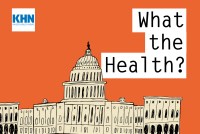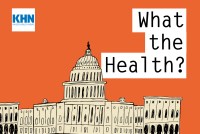Latest Morning Briefing Stories
Klobuchar Says D.C. Has Enough Drug Lobbyists To Double-Team Lawmakers
The drug industry has the biggest lobbying war chest.
GOP Senators Distance Themselves From Grassley And Trump’s Efforts To Cut Drug Prices
Even some Republicans who supported a sweeping bipartisan bill to rein in drug costs may not back it in the Senate vote.
KHN’s ‘What The Health?’: Cue The Drug Price Debate
Democrats and Republicans on the Senate Finance Committee unveiled their long-awaited proposal to try to rein in prescription drug costs, even as bipartisan leaders of the other Senate committee that oversees health announced it would not bring its drug price bill to the Senate floor until fall. Paige Winfield Cunningham of The Washington Post, Rebecca Adams of CQ Roll Call and Alice Miranda Ollstein of Politico join KHN’s Julie Rovner to discuss this, plus court actions on health issues.
Summer Setbacks: The Long Road To Lower Drug Prices Hits Some Potholes
Efforts to control drug prices seemed on a glide path earlier this year after gaining traction at the White House and in Congress. But prospects today look less certain and highly controversial.
¿Quieres retirarte y vivir en el exterior? Medicare no viaja muy bien
De 2012 a 2017, el número de trabajadores jubilados que vivían en países extranjeros y que recibían beneficios del Seguro Social creció casi un 15%, a más de 413,000, según la Administración del Seguro Social.
Federal Suit Alleges ‘Staggering’ Urine Drug Testing Fraud At Tennessee Pain Clinics
Tennessee company’s Medicare billings for urine tests were examined by Kaiser Health News in 2017.
Dream Of Retiring Abroad? The Reality: Medicare Doesn’t Travel Well
More than 400,000 U.S. workers have retired in foreign countries and their ranks are rising. But Medicare doesn’t cover most expenses overseas, so these expats will need to confront the cost of finding alternative insurance.
Missouri Firm With Silicon Valley Ties Faces Medicare Billing Scrutiny
Amid an overall crackdown on private insurers’ Medicare billing practices, a new government audit and a whistleblower suit allege St. Louis-based Essence Group Holdings Corp.’s Medicare Advantage plans overcharged taxpayers.
Insurers Running Medicare Advantage Plans Overbill Taxpayers By Billions As Feds Struggle To Stop It
An enhanced government effort to catch insurers that overcharge Medicare faces resistance from the insurance industry.
KHN’s ‘What The Health?’: Could The ACA Really Go Away?
Is the entire Affordable Care Act unconstitutional? That was the question before a federal appeals court in New Orleans this week. Two of the three judges on the panel seemed inclined to agree with a lower court that the elimination of the tax penalty for failure to maintain coverage could mean the entire health law should fall. Also this week, President Donald Trump wants to improve care for people with kidney disease. Joanne Kenen of Politico, Kimberly Leonard of the Washington Examiner and Alice Miranda Ollstein of Politico join KHN’s Julie Rovner to discuss this, plus courts blocking efforts to require drug prices in TV ads and to kick Planned Parenthood out of the federal family planning program. Plus, Rovner interviews University of Michigan law professor Nicholas Bagley about the latest legal threat to the ACA.














